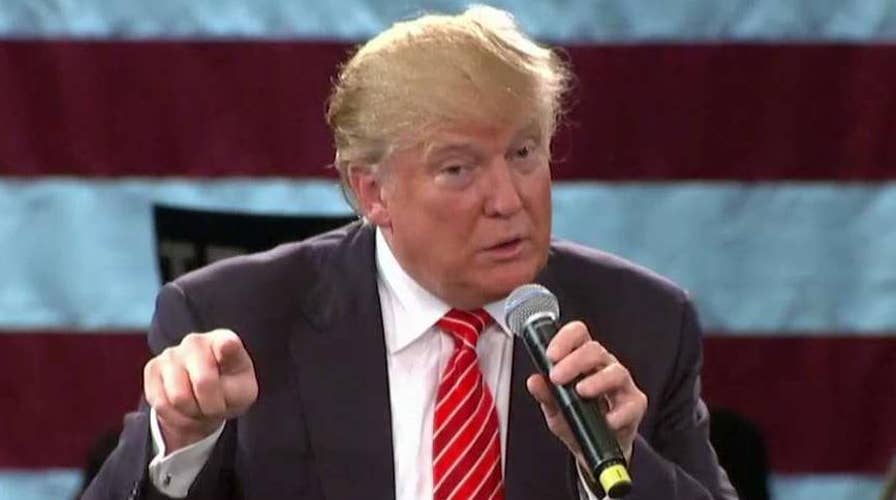President Trump orders construction of US-Mexico border wall
Chief White House correspondent John Roberts reports from Washington
President Trump signed executive actions Wednesday ordering the construction of a U.S.-Mexico border wall and targeting sanctuary cities, following through on campaign promises that energized his base – and outraged his critics – during the 2016 campaign.
The orders cover a range of immigration enforcement measures. The marquee item is a directive to pursue a southern border wall.
“A nation without borders is not a nation,” Trump declared after signing the measures, while speaking to employees at the Department of Homeland Security. “Beginning today, the United States of America gets back control of its borders.”
The first order calls for the “immediate construction of a physical wall on the southern border,” and directs the DHS secretary to take “all appropriate steps to immediately plan, design, and construct” the wall using authority under existing law.
While it’s not yet clear exactly how the project might be funded or how much it would cost, Trump reiterated his vow that Mexico “absolutely” will pay for the project eventually, something the Mexican government has denied.
“Ultimately it will come out of what’s happening with Mexico,” Trump told ABC News in a separate interview, adding construction could begin in a matter of months.
Mexico’s contribution aside, Press Secretary Sean Spicer said existing Homeland Security funding could be used for now to get started, and congressional appropriations eventually would be needed. The order itself calls for the preparation of congressional budget requests.
TALL TASK: PATCHY BORDER BARRIER SHOWS CHALLENGE AHEAD FOR TRUMP
The same executive order also calls for hiring 5,000 more Border Patrol agents and ending “catch-and-release” policies for illegal immigrants, among other provisions.
Another order is aimed at helping federal immigration agents. It calls for hiring 10,000 additional officers; restoring the so-called Secure Communities program and other local partnerships; prioritizing the deportation of illegal immigrant criminals; directing the State Department to use leverage to ensure illegal immigrants are taken back by their country of origin – and moving to strip federal grant money to sanctuary states and cities that “harbor” illegal immigrants.
The latter move is sure to trigger a backlash from the hundreds of jurisdictions that have such policies in place. But critics have blasted those policies in the wake of violent crimes committed by illegal immigrants who were effectively protected from deportation by local jurisdictions.
The immigration measures fall in the middle of a very busy first week for President Trump. He started with a measure withdrawing the U.S. from a controversial trade pact and others aimed at reviving massive pipeline projects that were stalled under the Obama administration.
From here, Trump is expected to address U.S. refugee and other visa policies.
A government source said these measures are likely to include the temporary suspension of visas from problem countries like Iraq, Syria, Sudan and Libya -- and could seek a reduction in the number of refugees admitted to the U.S.
The measures also could address the implementation of what Trump on the campaign trail called "extreme vetting" for certain visa applicants.
Trump campaigned on pledges to tighten U.S. immigration policies, including strengthening border security and stemming the flow of refugees. His call for a border wall was among his most popular proposals with supporters, who often broke out in chants of "build that wall" during rallies.
To build the wall, the president is relying in part on a 2006 law that authorized several hundred miles of fencing along the 2,000-mile frontier. That bill led to the construction of about 700 miles of various kinds of fencing designed to block both vehicles and pedestrians.
The Secure Fence Act was signed by then-President George W. Bush, and the majority of that fencing in Texas, New Mexico, Arizona and California was built before he left office. The last remnants were completed after President Obama took office in 2009.
The Trump administration also must adhere to a decades-old border treaty with Mexico that limits where and how structures can be buil. The 1970 treaty requires that structures cannot disrupt the flow of the rivers, which define the U.S.-Mexico border along Texas and 24 miles in Arizona, according to The International Boundary and Water Commission, a joint U.S.-Mexican agency that administers the treaty.
Fox News' John Roberts and The Associated Press contributed to this report.













































